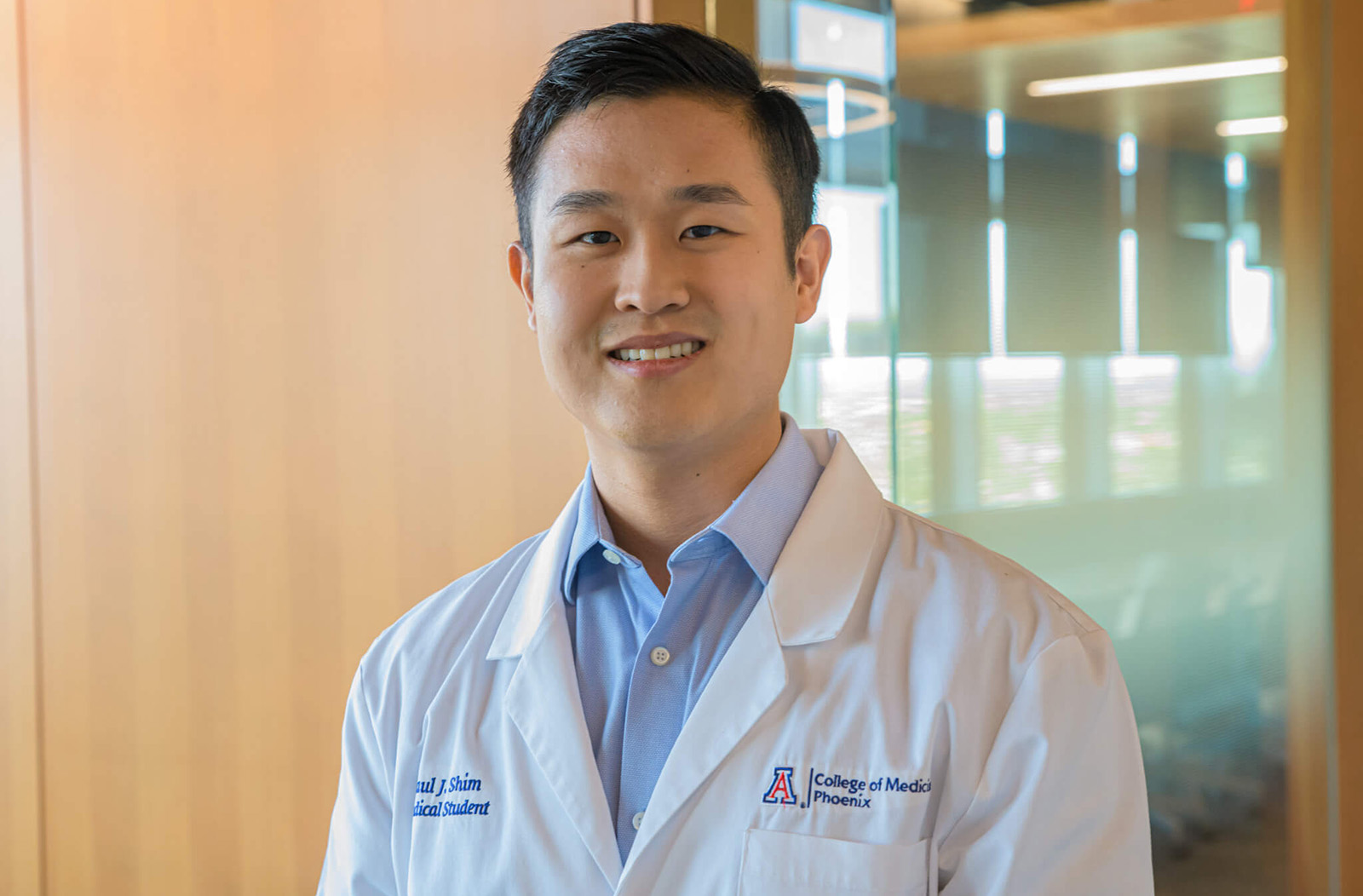
Medical Student Selected for Prestigious Sarnoff Research Fellowship

Third-year medical student Paul Shim has been chosen for the Sarnoff Fellowship — a nationally competitive fellowship awarded to a select group of medical students to conduct cardiovascular research in laboratories across the United States. He is the first student from the University of Arizona College of Medicine – Phoenix to receive the award.
Shim will be taking a year away from his medical school study to conduct research with Robert Lefkowitz, MD, a 2012 Nobel Laureate in Chemistry and distinguished professor of Medicine, Biochemistry, Pathology and Chemistry at Duke University.
Prior to beginning his studies with the College of Medicine – Phoenix, Shim interned in Dr. Lefkowitz’s lab. “I am excited to head back to a familiar place where I can work with an incredible scientist and mentor who not only engages in incredibly exciting and impactful research, but also is able to guide me through the process of successfully navigating the intersection between medicine and research,” Shim said.
In his letter of recommendation, Dr. Lefkowitz was complimentary of Shim’s work. “From my first interactions with Paul, it was evident that he was highly motivated and deeply interested in biomedical research,” he wrote. “He is one of the best undergraduates I have seen in my 50+ years as a physician-scientist.”
Dr. Lefkowitz’s lab consists of MD fellows from various subspecialties, as well as basic science researchers in pharmacology, structural biology, chemistry, molecular biology, biochemistry and cell biology. Its primary focus of study is on G protein couple receptors (GPCRs).
“Nearly a third of all FDA-approved medicines work at some form of GPCR, which activates many distinct biochemical signaling pathways to ultimately invoke a physiologic response,” Shim explained. Under the supervision of Alem Kahsai, PhD, assistant professor in the lab, Shim and his colleagues will analyze GPCR interactions.
One of those pathways is mediated by a protein called Beta-arrestin. Dysregulation of Beta-arrestin has broad implications among many diseases — including heart failure and COVID.
In his proposal for the fellowship, Shim outlined his desire to investigate, “The structural mechanisms of how Beta-arrestin binds to its various downstream signaling proteins. This will allow us to understand how to modulate Beta-arrestin activity, as well as discover possible binding sites that may be druggable and lead to future therapeutics.”
For Shim, the fellowship is an excellent opportunity to further explore his passion for this research, while also helping him to become a more well-rounded physician. “I hope to have a career where I can make discoveries that will help improve patient care from the bench to bedside,” he said.
Shim was also sure to thank John Regan, PhD, professor of Pharmacology and Toxicology at the U of A R. Ken Coit College of Pharmacy, and Lisa Shah-Patel, MD, his academic advisor at the College of Medicine – Phoenix, for their support in this pursuit. “They were instrumental in shaping my application and encouraging me to pursue this endeavor, and for that, I am grateful.”
The Sarnoff Cardiovascular Research Foundation seeks to develop medical students into the next generation of leaders in cardiovascular innovation, research, and medicine by providing mentored research.
Dana Boyd, executive director of the foundation, singled out Shim’s intellectual and academic achievements, as well as his leadership ability when discussing his successful candidacy.
Shim will begin the fellowship in July.
About the College
Founded in 2007, the University of Arizona College of Medicine – Phoenix inspires and trains exemplary physicians, scientists and leaders to advance its core missions in education, research, clinical care and service to communities across Arizona. The college’s strength lies in our collaborations and partnerships with clinical affiliates, community organizations and industry sponsors. With our primary affiliate, Banner Health, we are recognized as the premier academic medical center in Phoenix. As an anchor institution of the Phoenix Bioscience Core, the college is home to signature research programs in neurosciences, cardiopulmonary diseases, immunology, informatics and metabolism. These focus areas uniquely position us to drive biomedical research and bolster economic development in the region.
As an urban institution with strong roots in rural and tribal health, the college has graduated more than 1,000 physicians and matriculates 130 students each year. Greater than 60% of matriculating students are from Arizona and many continue training at our GME sponsored residency programs, ultimately pursuing local academic and community-based opportunities. While our traditional four-year program continues to thrive, we will launch our recently approved accelerated three-year medical student curriculum with exclusive focus on primary care. This program is designed to further enhance workforce retention needs across Arizona.
The college has embarked on our strategic plan for 2025 to 2030. Learn more.